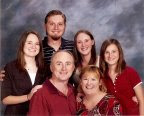We started our discussion of genres last time with a look at Magical Realism. Shortly after writing that post, I ran across a very fun read that is a great example of the genre. Horns by Joe Hill tells of a young man sprouting horns and slowly transforming into a demon. He knows others' most inner, most evil thoughts and uses that information to help solve a murder. It is written very believably and is a captivating story. I was intrigued to see in your comments that much of your writing falls in the Magical Realism catagory.
Another genre that has been getting quite a bit of attention from publishers lately is Alternate History. Alternate History plots usually contain historical characters and events but change some major detail, causing history to progress down a different path than it really did. Alternate history is often viewed as a subgenre of historical fiction or science fiction but many works stand on their own as uniquely Alternate History.
One of the seminal works of this genre is The Man in the High Castle by Philip K. Dick. In this classic, the United States has lost World War II and is ruled jointly by Japan and Nazi Germany. It won the 1963 Hugo award and firmly established Dick's literary career.
From the writer's perspective, there are both perks and pitfalls to writing in this genre. A definite perk is that characters and main plot lines can be taken from actual events, jump-starting the writing process. History can give an author the basic outline, rather than the author having to form a story from nothing. The problem of naming characters and places that was discussed in a recent Blood-Red Pencil post can be avoided by beginning with actual historical characters and events.
A pitfall, however, is that the characters and plot elements a writer adds must fit logically into the historical record. This may require some research into the actual historical events of the period. The Library of Congress and the National Archives websites may provide material to help authors with details of a plot centered on American history. Euro Docs and Gallica provide links to European historical documents and the Universiy of Washington Library has a list of helpful resources on Asian history.
Alternate History fiction can be a powerful teaching tool for history and literature teachers as well as an enjoyable area for recreational reading. Asking the question, "What if...?" helps us all think about our world and take valuable lessons from what actually was.
~~~~~~~~~
Jo Klemm has worked as a librarian since 1985, with the exception of the eight years she raised her three girls. She has worked in public, medical school, university, and community college libraries and is currently working at Tarrant County College in Arlington, Texas as a Public Services Librarian and doing coursework on a doctorate. In her spare time, she is a professional storyteller, focusing on western and Texas stories and Arthurian legends. The written and spoken word has always fascinated her and, though she embraces technology, she worries that it is moving us away from appreciation of the power of the written word. In her teaching, storytelling, and writing, she tries to inspire and empower students to learn from great authors, old and new, and to find their own voice on the page.


Genre tends to limit a writer on one hand because of its "requirements"; on the other hand, it creates a logical way to categorize a book as a mystery, romance, fantasy, how-to, history, etc., a necessity for bookstores and libraries. Subgenres offer a bit more latitude to the free-spirited writer with a unique imagination, but even these are not without guidelines.
ReplyDeleteTake alternate history, for example. Your comments drive home the point that research is vital, even in fiction--and this applies to all genres. A writer's failure to make the reader suspend disbelief can limit his success and call any future works into question. How so? If a story doesn't ring true, it doesn't work for the reader--and a lot of readers (and critics) know history (and a wide variety of other topics). This makes your mention of research sources particularly valuable to the author who wants to write a powerful and insightful story about what might have been.
Nice post, Jo!
I like the idea of alternate history. It's a shame it can only be fiction!
ReplyDeleteMorgan Mandel
http://morganmandel.blogspot.com
http://facebook.com/morgan.mandel
Jo, even though I read a lot, I don't think I've ever read a book that could be classified as alternate history. "The Man in the High Castle" is going on my TBR list so I can see what it's all about. Thanks for the interesting introduction to the genre.
ReplyDeleteWonderful post, Jo. I enjoyed reading about alternate history books.
ReplyDeleteThis comment has been removed by the author.
ReplyDeleteI think one of the finest examples of alternate history is the Robin Paige Victorian/Edwardian series written by Susan Wittig and Bill Albert. They took some major happening of the day for each book, did fantastic research, and then spun their protagonists around the real-life event. I've always thought these would make great adjunct novels for a history class.
ReplyDeleteInteresting post, Jo. Thanks!
Dani
Jo,
ReplyDeleteThanks for the great research links.
Charlotte
I used to feel frustrated by alternate histories, but maybe I grew into them. I wonder if there are genres that you have to be older to appreciate.
ReplyDelete